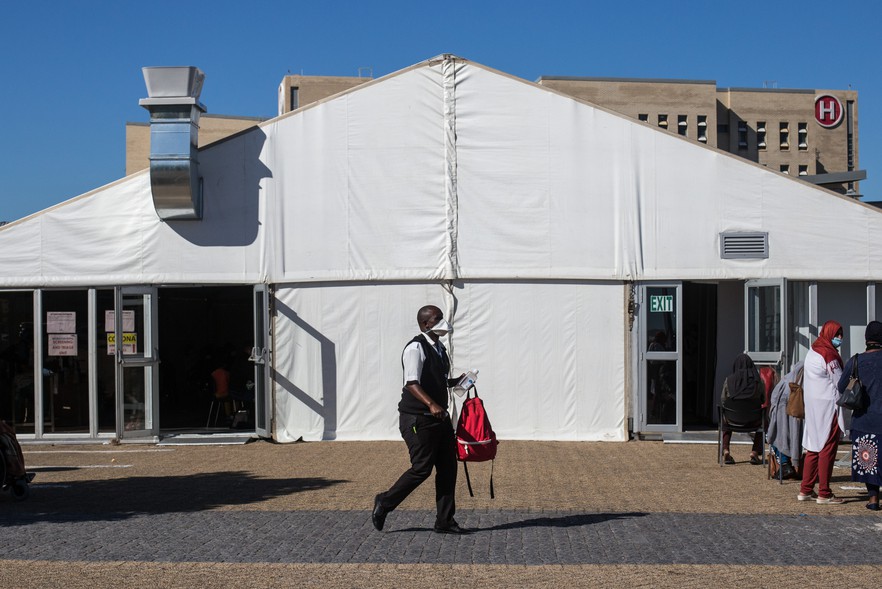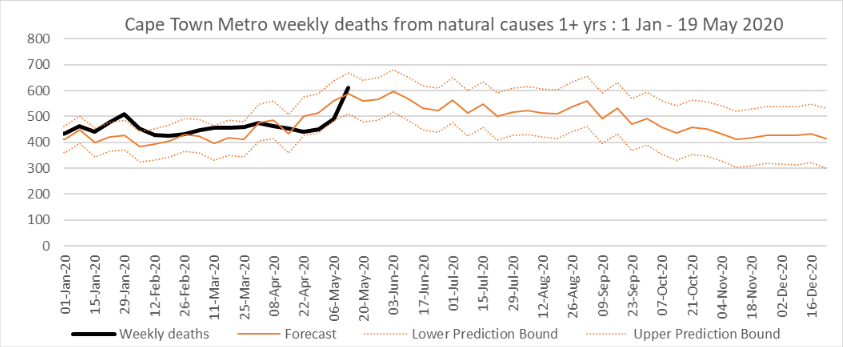Covid-19 Report 5: Spike in Cape Town natural deaths
Vaccine makes it through first hurdle, setback for antibody tests, and much more in our latest issue
A tent has been erected outside Mitchells Plain Hospital, where patients are screened for Covid-19 before entering the facility.
This is the fifth issue of Covid-19 Report. We point you to the latest quality science on the pandemic. If you come across unfamiliar terms, there is a glossary at the bottom of the article.
Spike in Cape Town natural deaths
The MRC has been publishing weekly updates of the number of registered deaths. This is vital to see the effect of the pandemic because deaths officially assigned to Covid-19 will be an underestimate. Throughout the lockdown actual deaths have been lower than expected deaths because of a decline in homicides and vehicle accidents.
Countrywide, this continues to be the case in the week ending 19 May.
But in the same week there has been a spike in natural deaths (i.e. deaths not due to violence, suicide or accidents) in Cape Town. For each week there is a lower and upper bound for the expected number of deaths, and the number midway between the lower and upper bounds. Cape Town’s natural deaths are higher than this midway number but lower than the upper bound. But they are also up sharply from the previous week when they were at the lower bound. An increase in Covid-19 deaths (or perhaps insufficient health-care capacity for patients with other illnesses, because of the rise in Covid-19 hospitalisations) is the likely reason for this.
Graph from MRC report showing spike in Cape Town natural deaths.
Analysing St Augustine’s outbreak
University of KwaZulu Natal researchers have published an investigation of the outbreak of Covid-19 at Netcare’s St Augustine’s hospital in Durban. Between 9 March and 30 April, 119 cases of Covid-19 were identified at St Augustine’s Hospital, 39 patients and 80 staff. Fifteen of the 39 patients died. There are eight recommendations summarised in this press release, or you can read the full report.
Vaccine gets through phase I trial
The Lancet has published the first phase I findings of a Covid-19 vaccine trial that we’ve seen in a reputable journal. The vaccine was found to be tolerable and produced an immune response. Every vaccine that makes it over this first hurdle is good news (expect quite a few more in the coming months), but it is only phase III trials that will tell us whether the vaccine actually saves lives – and those trials are at best still many months away. Typically in a phase III trial, participants are randomly divided among those who get the vaccine and those who do not, and the outcomes in the two groups are compared over time.
Bad news on much-hyped antibody tests
In a previous edition of Covid-19 Report, we mentioned that the pharmaceutical company Roche claimed its Covid-19 antibody test had a sensitivity of 100% (no false negatives) and a specificity of 99.8% (very few false positives), with the condition that it is at least 14 days since a PCR test would have shown you are infected. An evaluation by Public Health England (PHE) has now estimated the Roche antibody test’s sensitivity at only 87% at 14 days. According to PHE, an antibody test made by the company Abbott had a sensitivity of 93.9% (with Abbott also previously having claimed 100% sensitivity). The BMJ covers the story.
More bad news on hydroxychloroquine
An observational study published in The Lancet of over 96,000 people hospitalised with Covid-19 compared outcomes in patients who received chloroquine or hydroxychloroquine (with or without a macrolide) with people who did not receive any of these drugs. The study found no evidence of benefit of hydroxychloroquine or chloroquine when used either alone or with a macrolide and patients receiving these drugs were in fact slightly more likely to die. There may have been some confounding factors that could not be accounted for, since it was an observational study, but even so these findings leave little hope for hydroxychloroquine as a treatment for people hospitalised with Covid-19.
Given the increased mortality in this trial, the WHO has suspended enrolling patients on the hydroxychloroquine arm in its SOLIDARITY trial, pending a review. Some trials of hydroxychloroquine for the prevention of Covid-19 infection are however still under way.
Details of promising remdesivir trial
The NEJM has published findings from a randomised controlled trial of remdesivir for the treatment of patients hospitalised with Covid-19 (previous reporting of this study was based on a press release). Median recovery time for patients taking remdesivir in the study was 11 days compared to 15 days in patients who did not take the drug.
The study authors place the findings in context: “These preliminary findings support the use of remdesivir for patients who are hospitalized with Covid-19 and require supplemental oxygen therapy. However, given high mortality despite the use of remdesivir, it is clear that treatment with an antiviral drug alone is not likely to be sufficient. Future strategies should evaluate antiviral agents in combination with other therapeutic approaches or combinations of antiviral agents to continue to improve patient outcomes in Covid-19.”
Losing smell
There have been lots of reports about losing your sense of smell or taste being a symptom of Covid-19. An article in AIM tries to quantify this. The researchers analysed 2013 patients in Europe with mild to moderate Covid-19. 87% lost their sense of smell and 56% reported taste dysfunction. On average, sense of smell was lost for 8.4 days. “The prevalence of self-reported smell and taste dysfunction in our study is higher than previously reported and may be characterized by different clinical forms,” the researchers wrote.
No evidence of dangerous viral mutations
A study, not yet peer-reviewed, of 15,000 SARS-CoV-2 genomes from patients worldwide, found no evidence of mutations that were convincingly associated with increased viral transmission. “Instead, recurrent SARS-CoV-2 mutations currently in circulation appear to be either neutral or weakly deleterious [bad for the virus itself],” the researchers write.
Detecting virus in sewage systems
In a fascinating study, not yet peer-reviewed, researchers analysed sewage in an American city for coronavirus RNA. They found that RNA concentrations were “highly correlated with the Covid-19 epidemiological curve” and a “seven-day leading indicator ahead of compiled Covid-19 testing data and led local hospital admissions data by three days”. The authors suggest this may help decide when to “implement or relax public health measures and restrictions”. How practical or replicable this is remains unknown.
Increase in rate of positive tests
The Surveillance Reports section on the NICD’s website has become an increasingly useful source of information, publishing daily Covid-19 updates, weekly epidemiological reports, weekly testing reports, and some outputs and descriptions of the main epidemiological model government is using.
One interesting observation in the week 20 testing report is that the proportion of people who test positive has risen in recent weeks from about 3 to 5%, an observation that suggests a worrying, but expected, rise in South African infections.
Defending the World Health Organisation
False allegations have been made against the World Health Organisation by US president Donald Trump. They have been echoed by some local commentators.
Two articles by The Lancet’s editor, Richard Horton, set the facts straight. They are very short and worth reading: here and here.
Statement in defence of academic freedom
Hundreds of academics have signed a statement in support of Professor Glenda Gray and the principle of academic freedom of speech in the SAMJ. Gray is the MRC president who criticised aspects of the government’s response to Covid-19. The acting Director-General of Health then wrote a letter to the MRC calling for an investigation into Gray.
Glossary
- MRC (Medical Research Council): South African state research institution.
- AIM (Annals of Internal Medicine): Leading medical journal.
- NICD (National Institute for Communicable Diseases): South African state institution responsible for dealing with infectious diseases like TB and Covid-19.
- SAMJ (South African Medical Journal): South Africa’s leading medical journal
- The Lancet: Leading medical journal published in the UK.
Read Covid-19 Report 4
Support independent journalism
Donate using Payfast

Don't miss out on the latest news
We respect your privacy, and promise we won't spam you.
Next: SASSA applicants camped outside Mdantsane office
Previous: “My business will never be the same again” says Duduza spaza shop owner
© 2020 GroundUp.
This article is licensed under a Creative Commons Attribution-NoDerivatives 4.0 International License.
You may republish this article, so long as you credit the authors and GroundUp, and do not change the text. Please include a link back to the original article.


